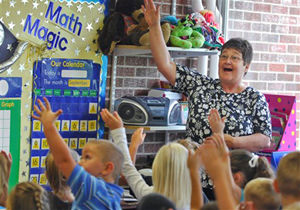Schooling Scholars on Classroom Success
There is of course no doubt that our public education system is broken. There is also no doubt that wages are too low. But blaming “bad teachers” is not the answer to either. These days everyone seems to think teachers need improving -- even people who uncover evidence to the contrary.
These days everyone seems to think teachers need improving — even people who uncover evidence to the contrary. A group of economists from Berkeley, Harvard and Northwestern recently made headlines when they published a study that was ostensibly about the relationship between teacher quality and student success as adults. The economists made three observations. The first is that when children are assigned to kindergarten classes randomly, test scores in some classes are higher than in others. The authors argue that these differences must be due to differences in teacher performance (as well as peer effects). The second observation is that children who attend high-score kindergarten classes earn more money in their adult life. Based on these two observations, the economists conclude that we should invest in raising the quality of teachers, and The New York Times goes a step further and argues that teachers should be paid according to their performance.
However, the economists also made a third observation that they dismissed as having no bearing on their conclusions: Children who attend high-score classes in kindergarten perform only negligibly better on standardized tests than other students in later years. Why? The authors claim this finding isn’t important. As Raj Chetty of Harvard, one of the economists who produced the study, told the New York Times, “We don’t really care about test scores. We care about adult outcomes.”
Obviously the authors do care about test scores, but only the ones that fit their hypothesis. If a child scores higher than her peers at age 5 but not in later years, why would she earn more than her peers do at age 27 (the age of the adults in the study)? Obviously it is not what she had learned in school that increased her earnings. But if not to begin to prepare their students for academic work in subsequent years, what should kindergarten teachers teach, then? And if academic performance in later years does not matter, what should teachers of any other grade teach? When placed in context, it becomes clear that rather than highlighting the value of teachers’ performance, what this study really does is cast doubt on the value of kindergarten education as a panacea for poverty.
The most interesting numbers in this study are those that the authors do not discuss, because they make it possible to compare the students in the study with students in general. The students in the study were 27 years old in 2007, and their average wage was $1,232 a month. Those who attended the highest-scoring class earned on average about $1,330, and those among all students in the study, regardless of which class they attended, who received nearly perfect scores on the standardized test earned on average about $2,080 a month. In 2007, the average wage for all 27-year-old full-time workers in the U.S. was $2,792, and the top 10 percent among these workers earned $4,800 more. Even the median wage was 20 percent higher than what these top kindergarten achievers were making. Clearly sending your kid to the best kindergarten class will not save her from poverty, and neither will exceptionally high scores on kindergarten standardized tests. What should these parents have done differently?
These children lived in Tennessee, and the very best thing their parents could have done for them would have been to move to another state. Tennessee is a “right to work state” with a law that gives an employer the right to employ a worker even when this worker does not pay union dues. This means that a worker can enjoy the high wages that a union brings without paying the costs that the union must endure, and the result is that union membership in Tennessee is remarkably low, 5.5 percent in 2007 as compared to a national average of 12.4 percent. Tennessee shows its hostility toward workers also by not having a state minimum wage law. Thus, in Tennessee the federal minimum wage applies, but the state does not enforce it. It is not surprising, then, that the median wage in Tennessee in 2009 was $2,456 a month while for the nation it was $309 higher, at $2,765.
There is of course no doubt that our public education system is broken. There is also no doubt that wages, whether in Tennessee or elsewhere, are too low. But blaming “bad teachers” is not the answer to either.
What schools need is more teachers so that classrooms can be smaller. In addition, teachers should be given incentives to make teaching a lifetime career, because the experience of teachers matters. In fact, these are the only valid results of the Tennessee classroom study.
What workers need are laws that permit them to vote for closed shops and that put a cap on the ratio between the highest- and lowest-paid employee, and a minimum wage that is a living wage. Teachers are workers who, like the rest of us, need and deserve better working conditions and better pay. What’s good for teachers is good for the rest of us.
Moshe Adler is the author of “Economics for the Rest of Us: Debunking the Science That Makes Life Dismal” (The New Press, 2010). He teaches economics at Columbia University and at the Harry Van Arsdale Center for Labor Studies at Empire State College.
Your support matters…Independent journalism is under threat and overshadowed by heavily funded mainstream media.
You can help level the playing field. Become a member.
Your tax-deductible contribution keeps us digging beneath the headlines to give you thought-provoking, investigative reporting and analysis that unearths what's really happening- without compromise.
Give today to support our courageous, independent journalists.






You need to be a supporter to comment.
There are currently no responses to this article.
Be the first to respond.